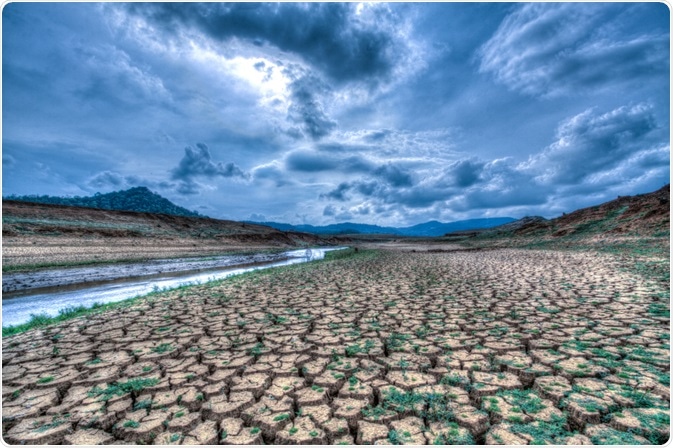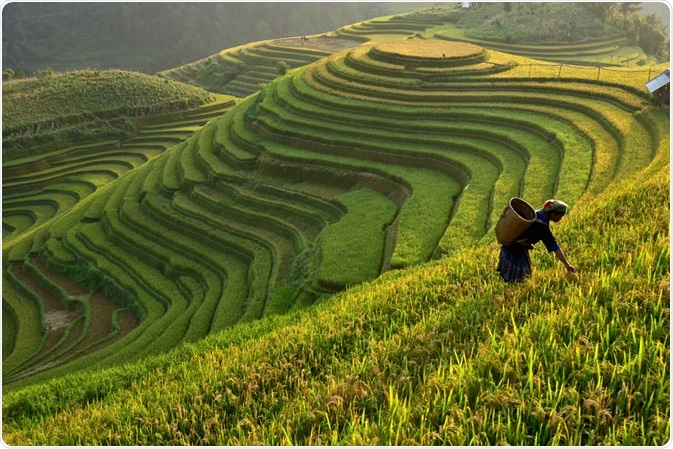The detrimental impacts of climate change are becoming increasingly obvious. Around the world, in all industries, the effects of global warming are presenting significant challenges to be overcome to secure our future.

Image Credit: Siyapath/Shutterstock.com
A United Nations report published last year states that the world is exploiting its precious land and water resources at “unprecedented rates”. Mounting pressure is being put on food availability due to the accelerating need to consume water and use the land as a result of our exponentially growing population, alongside increased rates of urbanization and the effects of climate.
Now, more than ever, the world needs reliable, healthy crop yields to feed its growing population. However, despite our technological advances, growing knowledge of agriculture, and hyper-connectivity facilitating food import and export around the world, experts are suggesting that we are heading toward a food crisis.
Below we discuss how climate change is playing a major factor in global food security by impacting crop yields.
Is climate change all bad news for crop yields?
Over the years, numerous studies have attempted to measure the impact of climate change on agriculture in an attempt to understand the relationship and mitigate any negative consequences. However, studies have provided different results, with some demonstrating an overall detrimental impact of climate change on crop yields, due to droughts and extreme weather, with others claiming a beneficial impact on crop yields due to increased carbon dioxide levels.
Data published by the National Geographic predict that by 2050, climate change will have force global production of corn to reduce by 24%, while rice, potatoes, and wheat will have fallen by 11, 9, and 3%, respectively. Given that along with soybeans, wheat, rice, and corn provide two-thirds of the human caloric intake, such a significant reduction in yields of these crops will undoubtedly severely impact global food security.
Currently, figures estimate that crop yields are already being affected by climate change. Global rice yields are, at present, estimated to be falling by 0.3% per year, global wheat yields are estimated to be falling faster, at 0.9% per year.
However, data does not show reductions for all crops in all regions. Some findings have shown that particular crops in specific locations have benefited from the increase in temperature and carbon dioxide. For example, studies have reported that crop yields of a few drought-tolerant crops have increased as a result of climate change.
In many parts of the developing world, sorghum is used as a food grain. Since the 1970s, yields of this crop have risen by 0.7% in sub-Saharan Africa, and by 0.9% in western, southern, and southeastern Asia as a result of climate shifts. It is believed that some plants have also shown that they are adapting to changing climates and continuing to survive in harsher conditions.
It is not sure if the few crops benefitting from climate change will continue to enjoy increased yields in the coming years. Numerous factors come into play to secure a healthy crop such as soil nutrients, soil water retention, water availability, and more. Given that all these factors are negatively impacted by climate change, it raises the question as to whether these rises in crop yield are temporary.

Image Credit: Sirisak_baokaew/Shutterstock.com
What are the impacts of climate change on agriculture?
While some studies have reported a beneficial impact of climate change on certain crop yields, it is evident that the overall impact is negative. A study by Boyer uncovered that the world’s crop yield has dropped by a huge 70% since 1982 as a result of climate changes. Another study revealed that only 3.5% of global cultivated areas are safe from this impact.
How climate change affects crop yields is complex, it involves a multitude of direct, indirect, and socio-economic climate change effects. Direct effects on the crop include morphological changes, physiological changes, phenotypic changes, and plant productivity; indirect effects include soil fertility, irrigations availability, sea levels, pest prevalence, temperature, and extreme weather such as droughts and floods; socio-economic effects include food demand, costs, policy, trade, and unequal distribution.
Strategies to mitigate the negative effects of climate change on crop yields
How climate change impacts crop yields and, therefore, food security is complicated and involves an interplay of numerous factors. For this reason, a variety of strategies must be implemented to intervene and address the damage of climate change across these factors.
Experts suggest that a combination of human interventions, adaption strategies, and mitigation strategies are required to reduce climate change and its effects to protect future agricultural production and global food security.
The take-home message is that climate change must be tackled now to prevent the global reduction in crop yields that is already happening. If not, within several decades we could find ourselves amid a food crisis, where demand for food has risen while production levels have reduced.
Sources:
- Climate change is affecting crop yields and reducing global food supplies. The conversation. Available at: theconversation.com/climate-change-is-affecting-crop-yields-and-reducing-global-food-supplies-118897
- Climate Change Threatens the World’s Food Supply, United Nations Warns. The NY Times. Available at: www.nytimes.com/2019/08/08/climate/climate-change-food-supply.html
- How to live with it: Crop Changes. The National Geographic. Available at: www.nationalgeographic.com/.../crops.html
- Raza, A., Razzaq, A., Mehmood, S., Zou, X., Zhang, X., Lv, Y. and Xu, J., 2019. Impact of Climate Change on Crops Adaptation and Strategies to Tackle Its Outcome: A Review. Plants, 8(2), p.34. https://www.ncbi.nlm.nih.gov/pmc/articles/PMC6409995/
- Ziska, L., Crimmins, A., Auclair, A., DeGrasse, S., Garofalo, J., Khan, A., Loladze, I., Pérez de León, A., Showler, A., Thurston, J. and Walls, I., 2016. Ch. 7: Food Safety, Nutrition, and Distribution. The Impacts of Climate Change on Human Health in the United States: A Scientific Assessment. s3.amazonaws.com/climatehealth2016/high/ClimateHealth2016_07_Food.pdf
Further Reading
Last Updated: Jul 29, 2020